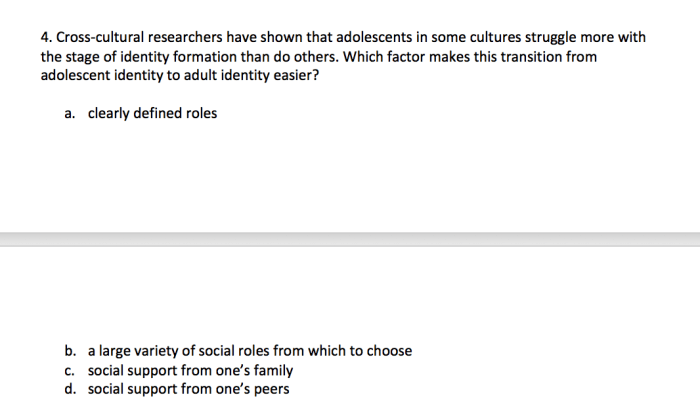As cross-cultural researchers investigating achievement motivation find, cultural factors play a significant role in shaping individuals’ drive to succeed. This article explores the impact of cultural values, norms, and practices on achievement goals, aspirations, and behaviors.
Cross-cultural research methods, including surveys, interviews, and observations, have been employed to examine cultural variations in achievement motivation. Studies have found that collectivist cultures, which emphasize group harmony and cooperation, tend to foster achievement goals that prioritize the well-being of the group over individual success.
In contrast, individualistic cultures, which value personal autonomy and self-reliance, encourage achievement goals that focus on individual accomplishments.
Cultural Factors Influencing Achievement Motivation
Cultural values and norms significantly shape individuals’ achievement motivation. Collectivist cultures emphasize interdependence and cooperation, leading to achievement goals that prioritize group success over individual accomplishments. In contrast, individualistic cultures value self-reliance and competition, fostering achievement aspirations that focus on personal excellence.
Social comparison and competition also vary across cultures. In competitive cultures, individuals are more likely to compare themselves to others and strive for status and recognition. Conversely, in cooperative cultures, social comparisons are less prevalent, and individuals tend to work together towards shared goals.
Cross-Cultural Research Methods: Cross-cultural Researchers Investigating Achievement Motivation Find
| Method | Description | Sampling | Data Collection | Data Analysis |
|---|---|---|---|---|
| Survey | Administering questionnaires to collect data on achievement motivation, values, and norms. | Random or stratified sampling | Self-report surveys | Quantitative analysis (e.g., ANOVA, regression) |
| Interview | Conducting in-depth interviews to explore individual perspectives on achievement motivation. | Purposive or snowball sampling | Semi-structured or unstructured interviews | Qualitative analysis (e.g., thematic analysis) |
| Observation | Observing individuals in real-life settings to assess their achievement behaviors and motivations. | Participant or non-participant observation | Field notes, video recordings | Qualitative analysis (e.g., grounded theory) |
| Cross-cultural comparison | Comparing achievement motivation patterns across different cultural groups. | Random or stratified sampling | Combination of methods (e.g., survey, interview, observation) | Quantitative and qualitative analysis |
Challenges and limitations:Cross-cultural research faces challenges such as language barriers, cultural biases, and differences in research methodologies. Researchers must carefully consider these factors to ensure valid and reliable data.
Cultural Variations in Achievement Motivation Patterns

| Region/Ethnic Group | Achievement Motivation Patterns | Empirical Evidence |
|---|---|---|
| East Asia | High achievement motivation, emphasis on academic success and competition. | Studies have shown high levels of achievement orientation and self-efficacy in East Asian cultures. |
| Western Europe | Moderate achievement motivation, balance between individual and collective goals. | Research indicates a focus on both personal accomplishment and social harmony. |
| Latin America | Varied achievement motivation, influenced by socioeconomic factors and cultural values. | Studies have found both high and low levels of achievement motivation within different Latin American countries. |
| Africa | Complex and diverse achievement motivation patterns, influenced by cultural, historical, and economic factors. | Research suggests a range of achievement motivations, from high aspirations to limited opportunities. |
Implications:These variations have implications for educational and workplace practices. For instance, in East Asian cultures, teachers may need to emphasize collaboration while maintaining a competitive environment. In contrast, in Western European cultures, educators may focus on fostering both individual and group achievements.
Theoretical Perspectives on Cross-Cultural Achievement Motivation

- Cultural orientation theory:Emphasizes the role of cultural values and norms in shaping achievement motivation.
- Social cognitive theory:Focuses on the interplay between individual beliefs, expectations, and environmental factors.
- Attribution theory:Examines how individuals attribute success or failure to internal or external factors.
- Expectancy-value theory:Considers the relationship between individuals’ expectations of success and the value they place on achieving goals.
Comparative analysis:These perspectives provide complementary insights into cross-cultural achievement motivation. Cultural orientation theory offers a broad framework, while social cognitive theory delves into individual processes. Attribution theory and expectancy-value theory focus on specific cognitive mechanisms.
Need for integrative models:Integrative models are needed to account for both cultural and individual factors. Such models can provide a more comprehensive understanding of the complex interplay between culture and achievement motivation.
Practical Applications of Cross-Cultural Research on Achievement Motivation

- Educational interventions:Designing culturally sensitive curricula and teaching strategies to promote achievement motivation in diverse student populations.
- Workplace practices:Creating inclusive and motivating work environments that recognize and support cultural differences in achievement motivation.
- Policy development:Informing policies and programs aimed at fostering achievement motivation and reducing educational and occupational disparities.
- Cross-cultural training:Equipping practitioners with the knowledge and skills to effectively work with individuals from diverse cultural backgrounds.
Importance of cultural competence:Cultural competence is crucial for practitioners working with diverse populations. It enables them to understand and respond to cultural variations in achievement motivation, creating more equitable and effective interventions and practices.
FAQ Explained
What are some key cultural factors that influence achievement motivation?
Cultural values, norms, and practices, such as collectivism vs. individualism, social comparison, and competition, can shape individuals’ achievement motivation.
How can cross-cultural research methods help us understand cultural variations in achievement motivation?
Cross-cultural research methods, such as surveys, interviews, and observations, allow researchers to collect data from different cultural groups and compare their achievement motivation patterns.
What are some practical applications of cross-cultural research on achievement motivation?
Cross-cultural research on achievement motivation can inform the development of culturally sensitive educational and organizational interventions and policies that promote student and employee success.



